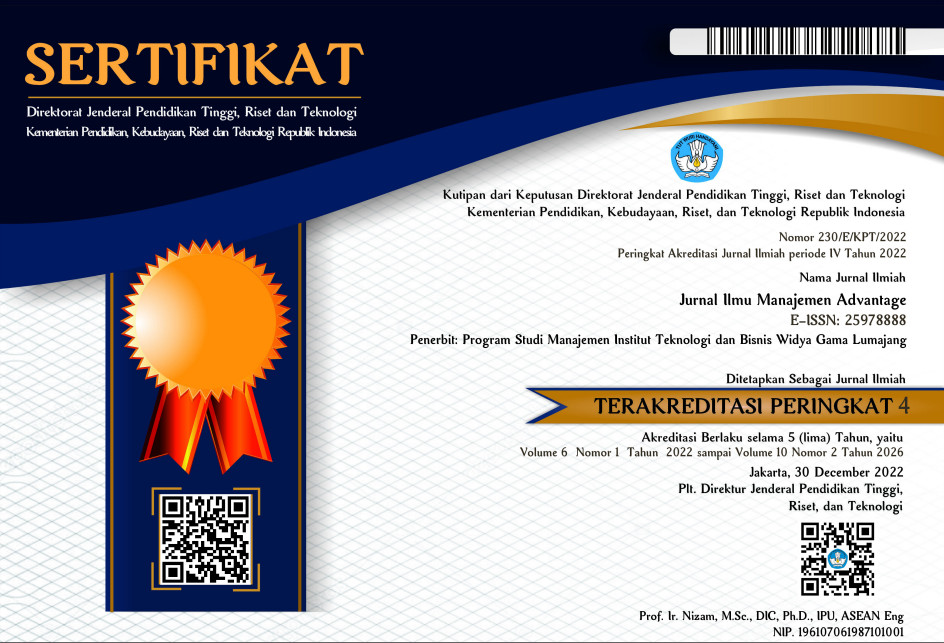Perceived Value as a Predictor of Behavioral Intention Mediated by Customer Engagement and Customer Satisfaction Sanding Waterboom Bandung Regency
DOI:
https://doi.org/10.30741/adv.v9i1.1516Keywords:
Perceived value, customer engagement, customer satisfaction, Behavioral intentionAbstract
This study aims to examine the influence of perceived value comprising functional value, epistemic value, social value, economic value on behavioural intention with customer engagement and customer satisfaction serving as mediating variables in the context of Sanding Waterboom a tourist destination in Bandung Regency. Expectation Confirmation Theory (ECT) is employed as the underpinning theory within the scope of artificial tourism. The study involved 140 respondents who had previously visited Sanding Waterboom. Data were collected using a cross-sectional approach and the research instruments underwent rigorous validity and reliability testing. The data were analysed using Structural Equation Modeling with SmartPLS software version 3.0. All proposed hypotheses were empirically supported. The findings indicate that perceived value exerts a positive influence on behavioral intention through customer engagement and customer satisfaction. This study makes a significant contribution to marketing literature by introducing epistemic value as a key antecedent of customer engagement. The novelty of this study lies in the addition of a hypothesis establishing a relationship between epistemic value and customer engagement. Future research is encouraged to explore other variables such as conditional value as potential drivers of behavioral intention particularly by aligning these variables with the unique attributes of the objects under investigation.
Downloads
References
Alandri, S. K. (2019). Sharia Hotel concept and customer value effect on customer satisfaction. Integrated Journal of Business and Economics, 3(2), 207. https://doi.org/10.33019/ijbe.v3i2.175
Andrea, N., & Sulaiman, F. (2024). Pengaruh kualitas pelayanan dan fasilitas wisata terhadap kepuasan pengunjung di objek Wisata Taman Rekreasi dan Rumah Susu Lachio Patumbak. J-MAS (Jurnal Manajemen Dan Sains), 9(2), 990. https://doi.org/10.33087/jmas.v9i2.1889
Angelakis, G., Vecchio, Y., Lemonakis, C., Atsalakis, G., Zopounidis, C., & Mattas, K. (2023). Exploring the behavioral intentions of food tourists who visit crete. Sustainability (Switzerland), 15(11), 1–18. https://doi.org/10.3390/su15118961
Cahigas, M. M. L., Prasetyo, Y. T., Nadlifatin, R., Persada, S. F., & Gumasing, M. J. J. (2023). Determinants of continuous visiting behavior to Palawan, Philippines: Integrating uncertainty reduction theory and expectation confirmation theory. Plos One, 18(10), e0291694.
Cohen, J. (1988). Statistical power analysis for the behavioral sciences (2nd ed.). Lawrence Erlbaum Associates.
Dewi, F. (2024). Persepsi pengunjung terhadap kualitas destinasi wisata Risma Café Resto dan Waterboom Lanrang Timoreng Panua di Bulo Kabupaten Sidrap. IAIN ParePare, 3(2), 207.
Effendi, S., & Tukiran. (2012). Metode penelitian survei (Edisi Revi). LP3S.
Hardisman. (2021). Analisis partial least square structural equation modelling (PLS-SEM). Bintang Pustaka Madani.
Hayadi, I., Daulay, M. Y. I., & Suryosukmono, G. (2023). Persepsi risiko: Minat dan perilaku berwisata di new normal. Jurnal Ilmiah Ekonomi Bisnis, 28(2), 183–195. https://doi.org/10.35760/eb.2023.v28i2.7225
Japutra, A., Loureiro, S. M. C., Molinillo, S., & Primanti, H. (2023). Influence of individual and social values on customer engagement in Luxury Thermal Spa Hotels: The mediating roles of perceived justice and brand experience. Tourism and hospitality research. https://doi.org/10.1177/1467358 4231188847
Kotler, P., Keller, K. L., Brady, M., Goodman, M., & Hansen, T. (2016). Marketing Management 3rd edn PDF eBook. Pearson Higher Ed.
Lee, J., & Kim, Y. K. (2020). Online reviews of restaurants: Expectation-confirmation theory. Journal of Quality Assurance in Hospitality and Tourism, 21(5), 582–599. https://doi.org/10.1080/1528008X.2020.1712308
Luo, B., Li, L., & Sun, Y. (2022). Understanding the influence of consumers’ perceived value on energy-saving products purchase intention. Frontiers in Psychology, 12(January), 1–13. https://doi.org/10.3389/fpsyg.2021.640376
Maharani, B. D., & Purnamarini, T. R. (2022). Aplikasi theory of consumption value terhadap intensi pembelian produk ramah lingkungan. Ecobisma (Jurnal Ekonomi, Bisnis Dan Manajemen), 9(2), 103–113. https://doi.org/10.36987/ecobi.v9i2.2448
Noviyanti, I., & Darmadi, D. (2023). Pengaruh kepemimpinan dan motivasi kerja. AMANAH: Jurnal Ilmiah Ilmu Manajemen, 1(1), 22–32.
Oktavia, R., & Sobari, N. (2021). The influence of customer engagement in customers’ behavioral intention on staycation: the experiential marketing perspectives moderated by health risk and financial risk. In International Conference on Business and Engineering Management (ICONBEM 2021) (pp. 244-251). atlantis press.
Oliver, R. L. (1980). A cognitive model of the antecedents and consequences of satisfaction decisions. Journal of Marketing Research, 17(4), 460–469.
Oliver, R. L. (1999). Whence consumer loyalty? Journal of Marketing, 63(4_suppl1), 33–44.
Prebensen, N. K., & Xie, J. (2017). Efficacy of co-creation and mastering on perceived value and satisfaction in tourists’ consumption. Tourism Management, 60, 166–176.
Putri, S. Y., & Ernawadi, Y. (2024). Pengaruh perceived value terhadap behavioral intention melalui customer engagement dan customer satisfaction Dreamland Waterpark Ajibarang. Journal of Economic, Bussines and Accounting (COSTING), 7(5), 1905–1921.
Ramdani, M. S., & Ernawadi, Y. (2023). Faktor-faktor yang mempengaruhi revisit intention wisatawan Kawah Putih. Ekombis Review: Jurnal Ilmiah Ekonomi Dan Bisnis, 11(2), 1293–1304. https://doi.org/10.37676/ekombis.v11i2.3723
Safitri, V. R. (2023). Pengaruh destination image dan customer satisfaction terhadap behavioral intention di Jawa Timur Park 1 Kota Batu. Jurnal Aplikasi Bisnis, 9(2),174-178.
Sanding Waterboom. (2024). Laporan tiket pengunjung tahun 2022 dan 2023.
Sashi, C. M. (2012). Customer engagement, buyer-seller relationships, and social media. Management Decision, 50(2), 253–272. https://doi.org/10.1108/00251741211203551
Sekaran, U., & Bougie, R. (2017). Metode Penelitian untuk Bisnis (Edisi 6). Salemba Empat.
Sheth, J. N., Newman, B. I., & Gross, B. L. (1991). Why we buy what we buy: A theory of consumption values: Discovery service for air force Institute of Technology. Journal of Business Research, 22(2), 159–170. https://doi.org/10.1016/0148-2963(91)90050-8
Shukla, A. , Mishra, A. & Dwivedi, Y. (2023) Expectation confirmation theory: A review. In Papagiannidis (Ed), TheoryHub Book. https://open.ncl,ac,uk / ISBN:9781739604400
Teng, H. Y. (2021). Can film tourism experience enhance tourist behavioural intentions? The role of tourist engagement. Current Issues in Tourism, 24(18), 2588–2601. https://doi.org/10.1080/13683500.2020.1852196
Wen, Y., Luo, F., & Li, H. (2024). The impact of aesthetic expectations and aesthetic experiential qualities on tourist satisfaction: A case study of the Zhangjiajie National Forest park. Forests, 15(2), 1–22. https://doi.org/10.3390/f15020378
Williams, P., & Soutar, G. N. (2022). Value, satisfaction and behavioral intentions in an adventure tourism context. Annals of Tourism Research, 36(3), 413–438. https://doi.org/10.1016/j.annals.2 009.02.002
Yamin & Kurniawan. (2011). Partial least square path modeling. Salemba Apotek.
Yoon, Y., & Uysal, M. (2005). An examination of the effects of motivation and satisfaction on destination loyalty: A structural model. Tourism Management, 26(1), 45–56. https://doi.org/10.1016/j.tourman.2003.08.016
Zhou, M., & Yu, H. (2022). Exploring how tourist engagement affects destination loyalty: The intermediary role of value and satisfaction. Sustainability (Switzerland), 14(3). https://doi.org/10.3390/su14031 621
Downloads
Published
How to Cite
Issue
Section
License
Copyright (c) 2025 Dewi Komala, Yadi Ernawadi

This work is licensed under a Creative Commons Attribution-NonCommercial 4.0 International License.










